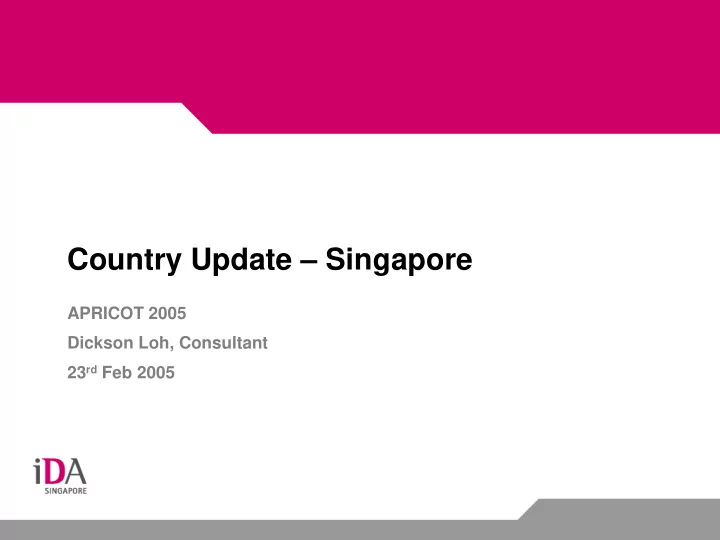

Country Update – Singapore APRICOT 2005 Dickson Loh, Consultant 23 rd Feb 2005
ENUM Proof-of-Concept Obtained ENUM delegation (5.6.e164.arpa) from ITU in 2003 Internal Trial (Proof-of-Concept) on IP Telephony using ENUM with open source software like Asterisk and SER Trial ENUM delegation to technology partners
ENUM Tech Trial Extension of Proof-of-Concept Participation from SingAREN, Institutes of Higher Learning and Research Institutes Singapore Polytechnic, Nanyang Technological University, and Institute of Infocomm Research. Setup with limited IP/PSTN interconnection Founded APEET with CNNIC, JPRS, KRNIC and TWNIC at APRICOT 2004. Exploration into VoIPv6
Tech Trial Network ENUM NS NTU NTU ENUM 1.1.1.1.4.6.5.6.e164.arpa NS PSTN PSTN 5.6.e164.arpa SIP Server IDA IDA PSTN Gateway SingAREN SIP Server SIP Server I 2 R I 2 R SIP Server SP SP ENUM PSTN PSTN NS PSTN Gateway 2.1.1.1.4.6.5.6.e164.arpa
Lessons from the Trial ENUM works! Key concerns are with IP Telephony rather than ENUM User familiarization with dial-plan NAT and Firewall issues Security policies issues Encryption of SIP header transaction End-to-end RTP session
On Policies and Regulations Started internal Working Group to work on policies on IP Telephony and ENUM, resulting with: Public Consultation Paper on Policy Framework of IP Telephony and Electronic Numbering in Singapore in Sept 2004 “Light touch” to encourage investment, innovation and development of IP Telephony Provide businesses and consumers more service choices in terms of price, quality and service features Regulations only to address certain economic, social/public and regulatory concerns
Policy Framework for IPT Number Allocation Currently, 8-digit numbers starting with different first digits are allocated for different services. (E.g. “6” for fixed line, “8” and “9” for mobile phone and paging) Assignment of new level “3” for IP Telephony services (10 million numbers), and assignment of 4 digit National Destination Code (NDC) if demand warrants. Interconnection and Access Mandatory only if other licensees request for interconnection Quality of Service QoS not imposed, but have to be made known to users.
Policy Framework for IPT Basic Obligation & Safety Service Provider to decide if emergency services is to be provided, but reserved rights to mandate this at a later stage Service Provider to decide if directory services is to be provided Number Portability Not required, but reserved rights to mandate this at a later stage Differentiation between “6” and “3” 8-digit numbers Current PSTN providers may switch to IP Telephony if they can meet the current requirements
Policy Framework for ENUM Telephone Number Resource Allocation Specific ENUM number to be made available only to an ENUM subscriber who has been assigned a corresponding telephone number ENUM Registration and Administration Use the current Registry-Registrar-Registrant model, adopted by SGNIC for registering domain names and maintaining its database, for the registration of “5.6.e164.arpa”. End Use ENUM Registration Let individuals decide whether they wish to register for ENUM and what information they want to make publicly available.
IP Telephony Regulation Principle: Remove impediments to market adoption Principle: Remove impediments to market adoption Summary Summary • IP Telephony can be classified under FBO or SBO license. • IP Telephony can be classified under FBO or SBO license. • Licensee is entitled to apply numbers in a new number block • Licensee is entitled to apply numbers in a new number block +65 3xxx xxxx. +65 3xxx xxxx. • Optional interconnection with PSTN, no mandatory QoS, optional • Optional interconnection with PSTN, no mandatory QoS, optional emergency service and no universal obligation. emergency service and no universal obligation.
Public Consultation on Proposed Policy Framework Response from 13 international and local companies, most favoring the light touch approach
Thank You dickson@ida.gov.sg
Recommend
More recommend